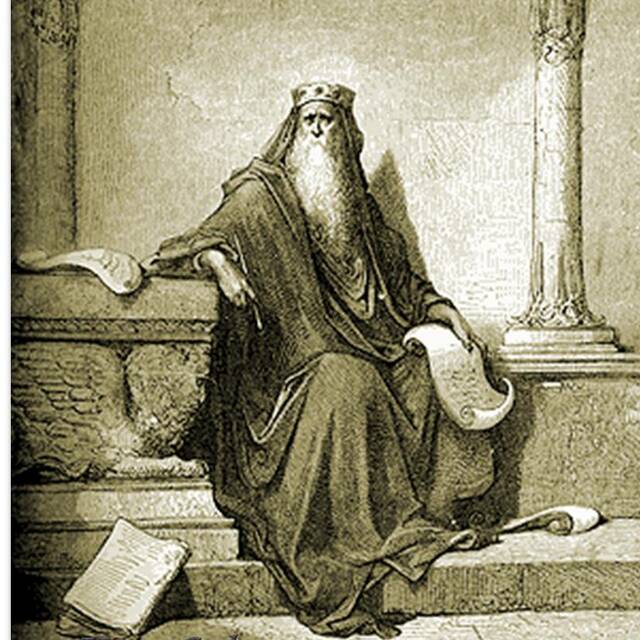Solomon’s Death
First Kings 11:41-43 and
Second Chronicles 9:29-31
Solomon’s death DIG: What eptaph should we write for this great man, who began so well, yet made such a tragic mistake? As we come to the end of Solomon’s life, how should be evalutate his kingship? What epitaph should we write on his tombstone?
REFLECT: One day death will come to each of us, as it comes for everyone. If death does not come today, it will come on some tomorrow. When it comes, what will people write on your tombstone? What will they say about you when your time on earth is done? Thougts?
The fear of ADONAI is the beginning of wisdom.
Now we come to the last word on King Solomon, at least for this part of the Bible, bringing us to the end of his famous kingship. After forty years on the throne, Solomon’s life ended the same way anyone’s life ends. He died and was buried, leaving behind his earthly splendor. Other activities of Solomon, all he accomplished and his wisdom are recorded in the Annals of Solomon (First Kings 11:41).

The Chronicler added: From beginning to end, are written in the records of Nathan the prophet, in the prophecy of Ahijah of Shilonite and in the visions of Iddo the seer concerning Jeroboam the son of Nebat (Second Chronicles 9:29). In typical fashion, the Chronicler revealed his overarching assessment of Solomon’s reign. His burial and report mentions that Solomon was buried in the City of David. Therefore, Solomon was honored as one of Isra’el’s greatest kings. From beginning to end, the Chronicler presented Solomon as the royal ideal.234 Solomon reigned in Jerusalem over all Isra’el for forty years. Then Solomon slept with his ancestors and was buried in the City of David his father, and Rehoboam his son became king in his place (First Kings 11:42-43; Second Chronicles 9:30-31). The royal line continued, as Solomon’s son Rehoboam ruled in his place. But the glory days were over, as we shall soon see.
As we come to the end of Solomon’s life, how should be evalutate his kingship? What epitaph should we write on his tombstone? There are many good lines to choose from Solomon’s own writings. If we consider the way he began, by asking ADONAI for the wisdom to rule over Isra’el we might choose: The fear of ADONAI is the beginning of wisdom (Proverbs 1:7). If we look at the way the king lived, especially in his later days, we might choose this verse instead: Eat, drink and enjoy the good life . . . under the sun (Ecclesiastes 5:18). But Solomon learned how empty it is to live without God, so maybe we should choose this verse instead: Mysterious! — says the Teacher — everything is mysterious (Ecc 1:2). Or we might look at the way the king died, and quote his famous words: Everyone comes from dust, and they will return to dust (Ecc 3:20). Since we are hopeful about Solomon’s salvation, then we could draw an epitaph from the love song he wrote for his Savior: He brings me to the banquet hall; His banner over me is love (Song of Solomon 2:4).
Whatever epitaph we write for Solomon, the fact that he needs an epitaph at all is a reminder of his limitations. Praise God that we know the greater Solomon of a greater Kingdom, who still has grace for us. We know Yeshua Messiah – the King without an epitaph for His tombstone. No one wrote an inscription for His grave. They did not even have time to prepare His body for burial, let alone carve His Name into stone. Besides, what epitaph would you write for a man who would come back to life on the third day? “Be back soon?” “See you on Sunday?” Maybe the words of the angels would suffice: He is not here, but He has risen (Luke 24:6). Praise God for Yeshua Messiah, the risen King, the true and righteous Solomon of our salvation! By the power of His resurrection, we will be able to serve ADONAI to the end of our days, and afterward to offer our Savior an eternity of praise.235
Dear Heavenly Father, As life on earth comes to an end for everyone, rich or poor, male or female – may we keep our eyes focused on eternity and the short time we have to say thank You to You. When our bodies die, we want to stand before You and have prepared a big gift of love. It is so important when going to a wedding to bring a very nice gift to the wedding. For the wedding of the Lamb has come, and his bride has made herself ready, For the fine linen is the righteous deeds of the kedoshim.” Then the angel tells me, “Write: How fortunate are those who have been invited to the wedding banquet of the Lamb!” He also tells me, “These are the true words of God.” (Revelation 19:7c-9). Our love, shown by our joyful obedience as we serve You, is our wedding gift for You. In Yeshua’s holy name and power of His resurrection. Amen



Leave A Comment